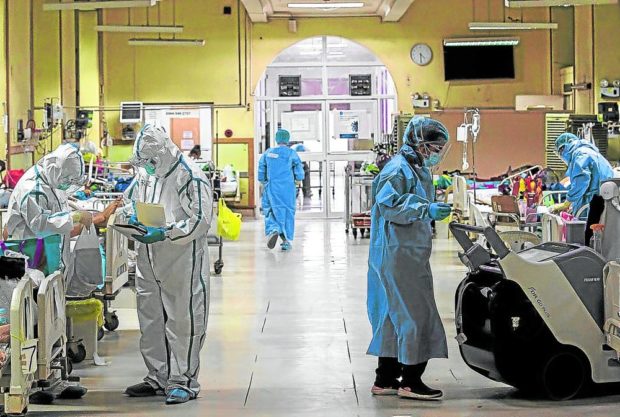MANILA, Philippines — Canada’s Saskatchewan province is seeking “to hire hundreds of health-care workers from the Philippines over the next two years.”
The move is part of Saskatchewan’s “plan to recruit, train, incentivize and retain more health-care workers to strengthen the provincial healthcare system,” the Canadian Embassy on Tuesday said in a statement on Facebook.
“We want to spread the word to health-care workers in the Philippines that our province is a place of great opportunity,” the embassy’s post quoted Saskatchewan’s Minister of Health Paul Merriman as saying.
He said full-time jobs will be offered to “registered nurses, licensed practical nurses, continuing care assistants, and medical laboratory assistants.”
“We would love to welcome into our friendly Saskatchewan communities healthcare workers from the Philippines who are interested in coming to work and live here along with their families,” he added.
‘Costs covered’
Saskatchewan, which borders the US states of Montana and North Dakota, is the first Canadian province to “pilot an accelerated training and assessment… for eligible nursing recruits from the Philippines,” the post said.
It added: “Participants will remain in the Philippines to fulfill the online components of this intensive educational program[,] and final clinical and practicum components [will be] completed in Saskatchewan.”
“Successful applicants who commit to a return for service agreement will have costs covered for… language and education assessments, bridging/training, fees related to professional exams and registration [and] other costs incurred while training such as travel for clinical placement,” the embassy said further.
Its statement also said “[S]pouses [of successful applicants] will receive assistance in securing employment in Saskatchewan within other industries such as trades, construction and food services.”
More details are available at saskatchewan.ca/HHR and https://www.healthcareersinsask.ca/lifestyle/saskatchewan/
Everett Hindley, Saskatchewan’s minister of mental health and addictions, seniors and rural and remote health, said in the statement that “our province has had much success in welcoming Filipino nurses and other health-care workers into our workforce and our communities.”
“We wish to invite the Filipino people to consider building a thriving career here in Saskatchewan, where you can enjoy a great quality of life, raise a family and be part of a strong and supportive community,” he added.
Tagalog top foreign language
Saskatchewan has an area of 651,900 square kilometers, half of it covered by forest while a third consists of farmland, and one-eighth, freshwater.
It is “home to more than 1.19 million people of many faiths, backgrounds and beliefs… and is the traditional territory of [the] First Nations and Métis,” the embassy said, referring to the indigenous peoples in the province.
The embassy also noted the “large Filipino community of about 33,000” in Saskatchewan, with Tagalog being “the number one foreign language spoken” there.
Apart from the jobs being offered to Filipino health workers, an agreement is being negotiated between the Canadian province and the Philippine government on their recruitment, according to the embassy.
Earlier this month, the Department of Migrant Workers signed a separate agreement with Alberta, the province west of Saskatchewan, aimed at strengthening cooperation in behalf of Filipino nurses already based there.
That accord also serves to “open partnerships, including the potential to establish an Alberta-accredited nursing program in the Philippines,” the Department of Foreign Affairs said in a statement.
Training for PH youth
Meanwhile, the US Embassy in Manila on Tuesday said the United States will invest an additional $3.8 million (P228 million) to provide free skills-based and work-based training to unemployed and out-of-school Filipino youth.
The embassy said the funding will particularly help YouthWorks PH, a private sector-driven partnership between the United States Agency for International Development and advocacy group Philippine Business for Education (PBEd).
“The US government is proud to invest in the Filipino youth. Together with PBEd, we are providing training opportunities that will lead them to employment so they can provide for themselves and contribute positively to society,” US Embassy Deputy Chief of Mission Heather Variava said in a statement.
PBEd chair Ramon del Rosario Jr. said: “With the help of our partners, we are able to provide work-based training, enhance their employability and help them get back on track.”

